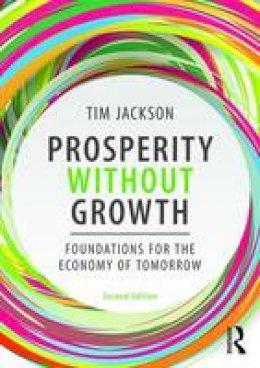

Stock image for illustration purposes only - book cover, edition or condition may vary.
Prosperity without Growth: Foundations for the Economy of Tomorrow
Tim Jackson
€ 23.19
FREE Delivery in Ireland
Description for Prosperity without Growth: Foundations for the Economy of Tomorrow
paperback. Num Pages: 336 pages, 22 black & white illustrations, 22 black & white line drawings. BIC Classification: KCN; RNU. Category: (UP) Postgraduate, Research & Scholarly; (UU) Undergraduate. Dimension: 212 x 148 x 21. Weight in Grams: 454. VOLUME 2
What can prosperity possibly mean in a world of environmental and social limits? The publication of Prosperity without Growth was a landmark in the sustainability debate. Tim Jackson's piercing challenge to conventional economics openly questioned the most highly prized goal of politicians and economists alike: the continued pursuit of exponential economic growth. Its findings provoked controversy, inspired debate and led to a new wave of research building on its arguments and conclusions. This substantially revised and re-written edition updates those arguments and considerably expands upon them. Jackson demonstrates that building a `post-growth' economy is a precise, definable and meaningful task. Starting from clear first principles, he sets out the dimensions of that task: the nature of enterprise; the quality of our working lives; the structure of investment; and the role of the money supply. He shows how the economy of tomorrow may be transformed in ways that protect employment, facilitate social investment, reduce inequality and deliver both ecological and financial stability. Seven years after it was first published, Prosperity without Growth is no longer a radical narrative whispered by a marginal fringe, but an essential vision of social progress in a post-crisis world. Fulfilling that vision is simply the most urgent task of our times.
Product Details
Format
Paperback
Publication date
2016
Publisher
Routledge
Condition
New
Number of Pages
310
Place of Publication
London, United Kingdom
ISBN
9781138935419
SKU
9781138935419
Shipping Time
Usually ships in 2 to 4 working days
Ref
99-1
About Tim Jackson
Tim Jackson is Professor of Sustainable Development at the University of Surrey, UK, and Director of the Centre for the Understanding of Sustainable Prosperity (CUSP). For seven years he was Economics Commissioner on the UK Sustainable Development Commission, where his work culminated in the first edition of this book. He was awarded the Hillary Laureate for exceptional international leadership in 2016. In addition to his scientific work, Tim is a prize-winning dramatist with numerous radio writing credits for the BBC.
Reviews for Prosperity without Growth: Foundations for the Economy of Tomorrow
`It is hard to improve a classic, but Jackson has done it... a clearly written yet scholarly union of moral vision with solid economics.' - Herman Daly, University of Maryland, USA `I remember exactly where I was when I first read Prosperity Without Growth. It cut through the intellectual clamour with clarity, courage - and hope.' - Naomi Klein, Author of This Changes Everything: Capitalism vs. The Climate `An excellent critical review of mainstream academic thoughts on poverty in the contemporary global system; a convincing illustration of the shortcomings of these thoughts on the case of Canada' - Samir Amin, Professor of Political Economy, Director of Third World Forum and Chair of World Forum For Alternatives, Egypt `With much of the world in turmoil, calling for higher economic growth is every politician's comfort blanket of choice. But Tim Jackson compellingly urges those politicians to give up their comfort blanket, to re-think our continuing dependence on economic growth, and to start preparing - urgently - for a world where such growth is no longer viable as its environmental cost massively exceeds its benefits. Prosperity Without Growth remains the single most important book addressing this most critical of contemporary challenges.' - Jonathon Porritt, Founder Director of Forum for the Future, UK. `Tim Jackson's Prosperity without Growth systematises and renders tangible an essential project few believed to be practical: recovering the dream of shared prosperity and human development through decoupling it from the bandwagon of growth. Essential reading for those refusing to succumb to a dystopic future.' - Yanis Varoufakis, DiEM25 co-founder and Professor of Economics, University of Athens, Greece. `Tim Jackson has brought his ground-breaking book bang up to date and substantially deepened its arguments. This extensively revised edition sets out more clearly than ever the dimensions of a new and different economics - working for people, planet and prosperity. There isn't a better exposition out there of why and how we need to move beyond growth.' - Caroline Lucas, MP for Brighton, Pavilion and a member of the Green Party, UK. 'One of the most important essays of our generation: both visionary and realistic, rooted in careful research and setting out difficult but achievable goals, it gives what we so badly need - an alternative to passivity, short-term selfishness and cynicism.' - Dr Rowan Williams, The Master of Magdalene College, Cambridge University and was the 104th Archbishop of Canterbury, UK. `This challenge to the prevailing growth-based economic paradigm confronts an inescapable dilemma: how to reconcile our aspirations for the good life with the limitations and constraints of a finite planet. Its thoughtful and penetrating critique is enriched by an outline of credible programs to achieve this end. A very valuable contribution to urgent concerns that cannot be ignored.' - Noam Chomsky, Institute Professor & Professor of Linguistics, MIT, USA. `Tim Jackson spearheads the obvious truth that GDP growth is not necessary in order to achieve higher well-being in the rich world. Government intervention can produce the desired result, namely full employment, less inequity and reduced greenhouse gas emissions.' - Jorgen Randers, author of 2052 - A Global Forecast for the Next Forty Years (2012) and co-author of One Percent is Enough. Managing economic growth to reduce unemployment, inequity and greenhouse gas emissions. (2016)
